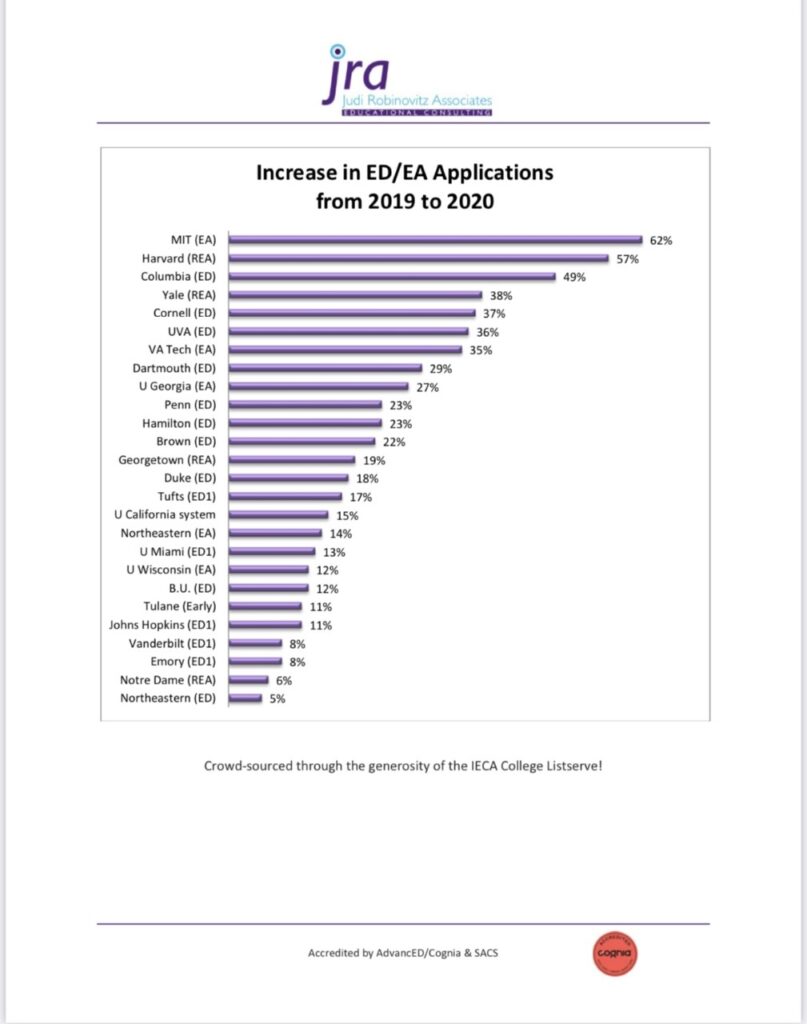The largest applicant pool in history, but why?
January 5th, 2021Many colleges and universities are reporting their largest early applicant pools in history. The increase comes in part from new financial aid programs supporting students through the pandemic, as well as the decision by many institutions to make standardized tests optional. More students are applying, understanding that their applications will be reviewed in a more qualitative way than ever before. Virtual recruitment has also been a significant factor in expanding applicant pools.
To illustrate the dramatic rise in early applications to selected universities, a colleague created this graph. If you gulp when seeing it, you’re in good company!

Despite this year’s heightened competition in a certain subset of colleges, many excellent choices remain beyond this group. Although media reports may lead you to believe otherwise, the vast majority of colleges are making decisions in line with recent history. Now, more than ever, we remain focused on best fit and continue to give serious weight to a wide range of options.
In the article linked below, Josh Stephens has published his thoughts about what’s happening and why. We think his article provides great insight as this year’s applicant numbers have taken us all by surprise. While we do believe his message is important, we don’t want it to completely rule your thought process while continuing this admissions journey. Many students are seeing their hard work pay off and are receiving offers from their top choices. Unfortunately, we are also seeing some disappointment, which is completely normal. Sometimes it is okay to trust the process and know that your final destination will be where you were always meant to go. Being offered admission to your green or yellow light schools is still a win! Always remember that those schools made it to your list for very good reasons in the first place.
Article referenced below from Medium published on December 20, 2020, written by Josh Stephens
2020 Early College Application Numbers Defy Expectations
Early Decision and Early Action decisions just came in for the 2020 application season. The numbers are like, in the immortal words of Johnny Utah, woah.
The short version is: conventional wisdom, among college counselors and many other folks associated with college admissions, speculated that application would drop; instead, they’re up. In some cases, way up. That means admission rates are down. In some cases, way down.
Admitted, denied or deferred, you’ve got this!
December 22nd, 2020Admitted, denied, or deferred: everyone applying for Early Action or Early Decision receives one of these three responses. If admitted, celebration and confetti ensue!
There is a harshness to the other outcomes, though, because after a long and arduous process we have now been told that we are not good enough, right? No, not right at all!! EA and ED applicant pools at renowned colleges are larger than ever before, making this year’s review rounds the most competitive ever, for the most part.
Logically, we know that admission decisions are made with incomplete information, and regardless of how you may have poured your heart into that beautiful essay, this is not an indictment of your character or abilities. After this initial jolt to the heart, we trust you all will take a step back and consider those outcomes for what they are, a necessary step in the process. It is not a judgment on your abilities and certainly not an indicator of future success or failure. There are so many college applicants who will be let down or boosted up this month, and we encourage everyone to support each other and offer an encouraging word when you can.

Disappointment and resilience: how do these two words go together? For every defeat there is an opportunity, and every setback is a lesson to carry with you as you grow.
In today’s classic article from the Wall Street Journal, author Sue Shellenbarger offers stories from highly successful people who were rejected from the college they considered their first choice, sharing how they viewed that decision then and how they see it now. While the article was written more than a decade ago, the life lessons are timeless.
Article referenced below from The Wall Street Journal, published March 24, 2010 written by Sue Shellenbarger
Before They Were Titans, Moguls and Newsmakers, These People Were…Rejected
Few events arouse more teenage angst than the springtime arrival of college rejection letters. With next fall’s college freshman class expected to approach a record 2.9 million students, hundreds of thousands of applicants will soon be receiving the dreaded letters.
Teenagers who face rejection will be joining good company, including Nobel laureates, billionaire philanthropists, university presidents, constitutional scholars, best-selling authors and other leaders of business, media and the arts who once received college or graduate-school rejection letters of their own.
Fake news: debunking myths about the college admissions process
December 8th, 2020The spread of misinformation has long been a problem in our culture and now with social media, it is so prevalent that we have all learned to “fact-check” as a common practice. Today we want to apply that fact-checking to some of the most common misconceptions around the college admissions process.

Author Brennan Barnard wrote a great article for Forbes addressing common myths heard by parents and students alike. Although this article is a bit lengthy, it’s packed with helpful and thought-provoking information. Take the time to read it all the way through, as we trust you’ll find his insights useful as a fact-checking resource in the months ahead.
Article referenced below from Forbes, originally published November 2, 2020, written by Brennan Barnard
Where do you turn for information about college admission? Do you rely on friends, parents, neighbors, siblings, teachers, coaches, or counselors? Perhaps you default to the internet and the sea of sources for admission related news? From webinars, virtual visits, and search engines to rankings and crowdsourced rumor mills like College Confidential and Reddit, there is an unimaginable amount of content. It is enough to make one’s head spin. What is credible? Who is reliable? And, when is someone simply trying to profit from the angst that students, and those who support them, feel as they approach this experience?
We are living in the age of information overload and one need not look beyond the presidential election to realize the need to fact-check the news we are being fed. From Politifact to Factcheck.org, there are entire institutes and websites dedicated to verifying what is accurate in politics. But who is responsible for setting the record straight in college admission?
Virtual campus tour tips
November 24th, 2020Learning online, socializing online … and touring college campuses online? Can a virtual experience substitute for actually being on campus? For the time being, we’ll have to say yes! Silver lining: you are continuing to master skills of resilience, creativity and flexibility and those skills will serve you well for a lifetime.

College admission offices are learning to be flexible as well. Virtual tours were available pre-pandemic, but considered sort of a side note. Now, virtual tours are often the primary introduction for prospective students.
So, admission offices have beefed up what they’re offering and have developed a tremendous amount of new online content to help you. Many offer not only a 360 degree view of the campus, but online information sessions, interviews and preview days, where faculty are available to talk about academic programs and students are on hand to discuss student life.
Gaining perspective on each school will take research and planning on your part in order to really maximize the opportunities available. The article referenced below from Cappex answers important questions about virtual tours and will serve as a guide as we continue to navigate this virtual world we are now living in.
Article referenced below from Cappex.com
For the majority of high school and college students, learning will be virtual this year. Some of the largest colleges and high school systems in the nation have already called it (the University of California, Chicago Public Schools… and on and on) and, hopefully at worst, virtual learning won’t extend past Summer 2021 — which is something that all seniors looking at colleges currently need to remember.
It may not feel important now to know about the city your college is in, what the dorm rooms look like, or what services are offered on campus, but, at some point, it will. Don’t gloss over asking the important on-campus questions, as well as questions about academics and virtual capabilities, just in case virtual learning extends into Fall 2021. Fingers crossed we won’t have to cross that bridge, but let’s be ready just in case we do.


